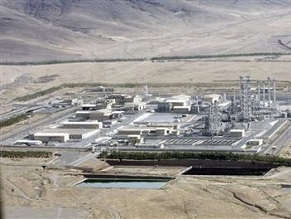|
World Jewish News

The Arak heavy water reactor is located 190 km (120 miles) southwest of Tehran
|
Iran could produce weapons-grade plutonium by next summer
08.08.2013, Israel and the World The United States and European officials fear that Iran could produce weapons-grade plutonium at its Arak heavy water reactor by summer 2014, according to a report in the Wall Street Journal.
International concerns over Iran’s nuclear development have largely focused on the continuing enrichment of twenty per-cent enriched uranium, considered just a small step from weapons-grade material.
The Wall Street Journal quoted an unnamed International Atomic Energy Agency (IAEA) official saying “it really crept up on us” while a senior European official involved in Iranian diplomacy commented, “We are increasingly concerned about activity…at Arak.”
The last IAEA report on Iran’s nuclear programme, published in May also gave significant attention to the ongoing development of the Arak heavy water reactor. The plant could be used to produce plutonium, which can be utilised to make smaller, even more powerful nuclear warheads than weapons-grade uranium.
Israeli Prime Minister Benjamin Netanyahu on Tuesday said that international pressure is the only way to prevent Iran from attaining nuclear weapons.
His comments came after Iran’s new President, Hassan Rouhani, who was sworn in on Sunday, spoke to the media for the first time yesterday. He said Iran “is determined to resolve this issue,” over its nuclear ambitions, so long as the United States displays “goodwill.”
Rouhani added, “We are determined and ready to enter serious and substantive negotiations with the other side.” However, he criticised the approval of further sanctions on Iran’s oil industry last week by the US House of Representatives and in a thinly veiled reference to Israel claimed that such decisions were in “the interests of a foreign country… even US interests are not being considered.”
Until now, several rounds of talks between the so-called P5+1 forum (United States, UK, China, Russia, France as the permanent members of the UN Security Council and Germany) and Iran have failed to make any real progress.
Speaking to a delegation of visiting US Congressmen in Jerusalem, Netanyahu refuted Rouhani’s suggestion that only talks could resolve the impasse. He said, “Iran’s president said that pressure won’t work. Not true! The only thing that has worked in the last two decades is pressure.” He added, “And the only thing that will work now is increased pressure. I have said that before and I’ll say it again, because that’s important to understand. You relent on the pressure, they will go all the way.”
US State Department spokeswoman Jen Psaki said that although Rouhani’s election provided an opportunity to resolve international concerns, “there are steps they need to take to meet their international obligations… and the ball is in their court.”
In Brussels, the spokesman for EU foreign policy chief Catherine Ashton, who coordinates international talks with Iran over its nuclear program, said: “We hope that the new Iranian government will be prepared to make rapid progress towards addressing international concerns about its nuclear programme and engage constructively.”
by: Yossi Lempkowicz
EJP
|
|
